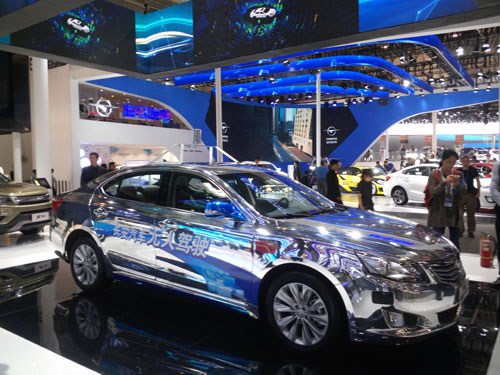Road-test ban may set back self-driving car
 0 Comment(s)
0 Comment(s) Print
Print E-mail China Daily, July 29, 2016
E-mail China Daily, July 29, 2016
 |
|
A self-driving car manufactured by Chongqing Changan Automobile Co, a modified version of its Raeton sedan, stands on display as a technician fixes a sensor onto its roof at the Beijing International Automotive Exhibition in Beijing in April. [Photo/Shanghai Daily] |
Chongqing Changan Automobile Co, the Chinese automaker that completed a 1,931-kilometer trek with a self-driving car earlier this year, has postponed public road tests in response to a regulatory ban it said could impede efforts to develop autonomous vehicles.
The joint venture partner with Ford Motor Co will try to simulate real-world traffic conditions in private testing yards and has suspended all road tests on public streets, said Liang Fenghua, the head of Changan's intelligent vehicle division.
China's auto industry regulator said last week that it is working with police on rules governing autonomous-car testing and warned automakers against conducting public highway trials before the regulations are released.
"We can make up for it if we don't need to wait longer than a year," Liang said by phone from Chongqing. "Eventually, the tests have to be carried out on real roads in large scale. Simulations are remedial measures we take to reduce the impact as much as possible, but cannot replace real road tests."
Changan joins Baidu Inc and Zhejiang Geely Holding Group Co in urging the government to speed up the drafting of a legal framework for technology being pursued worldwide to make roads safer. Carmakers have emphasized local road testing will be vital to developing cars capable of self-navigating the complex traffic conditions, driving habits and road signage associated with the world's largest auto market.
In the United States, the National Highway Traffic Safety Administration's Mark Rosekind said last week that no incident would derail efforts to improve road safety, without specifically mentioning Tesla Motors Inc. The automaker has continued public beta testing of its Autopilot system despite a fatal crash in May.
"There needs to be a balance," said Steve Man, an auto analyst in Hong Kong with Bloomberg Intelligence. "If local companies are barred from doing it at all, there's a high risk for them to fall behind. It is of big concern to them."
Changan's 1,931-km autonomous driving trip from Chongqing to Beijing in April followed a similar road test by Volvo on Beijing's Sixth Ring Road last year. China's self-driving vehicle push has been part of a broader initiative urging manufacturers to upgrade their technology, as lower-cost countries emerge and compete for labor-intensive factory jobs.
The Ministry of Industry and Information Technology and the Ministry of Public Security have a preliminary draft of the rules to govern testing of autonomous cars, She Weizhen, head of the MIIT's autos department, said in a forum in Beijing last week. With ambitions to produce highly automated vehicles by 2020, Changan will run more tests once regulations are finalized to catch up with competitors, Liang said.
"I'm not optimistic about the rules coming out soon," said Jia Xinguang, an analyst with the China Automobile Dealers Association.






Go to Forum >>0 Comment(s)